Year 2025
Episode 12
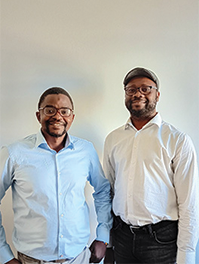
Tevodai Mambai - "We have new insights to contribute to the University of Bern"
Recording date: 10.07.2025
Moderator: Djouroukoro Diallo. Production: Patricia Teixidor. Music: Intro and outro: "Yadina" (xylophone duet). CD 1. MBUDI MBUDI NA MHANGA-NYMBO ZA WADODO. The Musical Universe of the Wagogo Children from Tanzania ©PoloVallejo. Musical pauses: Ethnic, by Sneaky Club; Village, by Sneaky Club. Free Music Archive.
Tevodai Mambai was born in Mokolo, in Cameroon, and arrived in Bern in 2022. He has been pursuing his PhD research at the University of Bern at the Institute of Germanic Languages and Literatures.
He studied German language and literature, education, and didactics at the University of Yaoundé. He worked for several years as a secondary school teacher of German as a foreign language in Maroua, Cameroon. He completed his master's degree at the University of Maroua with a thesis on the modernization and Christianization of the mountain people of northern Cameroon based on the travelogues of the Swiss travel writer and filmmaker René Gardi. He examines how mountain dwellers in North Cameroon and North-East Nigeria were depicted in Swiss and German-language travel and mission reports from 1940 until 1990.
There is extensive information about his research in this article by UniAktuelle:"Bern travelers sought their salvation in Africa – with fatal consequences."
He feels that African researchers like him have new insights to contribute to the University’s landscape; “we have our own opinions, experiences, beliefs, and way of doing things”.
Episode 11
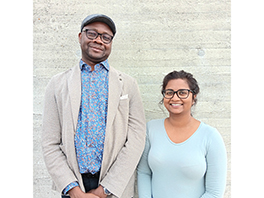
Pooja Singh – “The time is right for capacity building in Africa so we can take control of our scientific landscape”
Recording date: 02.07.2025. Moderator: Djouroukoro Diallo. Production: Patricia Teixidor. Music: Intro and outro: "Yadina" (xylophone duet). CD 1. MBUDI MBUDI NA MHANGA-NYMBO ZA WADODO. The Musical Universe of the Wagogo Children from Tanzania. ©PoloVallejo. Musical pauses: Free Music Archive. The Bridge to Botswana IV (FMA Edit) by David Michael is licensed under a Attribution-Noncommercial-No Derivative Works 3.0 United States License.
Pooja Singh is a postdoctoral researcher at the Institute of Ecology and Evolution at the University of Bern, where she works on the genomics of cichlid populations and speciation. She is an evolutionary biologist from Botswana, living and working in Bern for the past four years. Growing up surrounded by nature in Botswana inspired her to become a biologist and to explore how wildlife systems function.
She feels strongly about representing Africa as a scientist. For her, being an African woman in science is deeply meaningful, precisely because there are still so few. She suggested that Initiative Afrique could support African PhD students and postdocs in navigating the European and Swiss academic environment, as well as the funding landscape. “We need to create longer-term and permanent positions for African leaders at the University, because there are literally only a handful…”
She would like to play a larger role in promoting equitable research partnerships between Africa and the University of Bern.
More info about her research here.
Episode 10
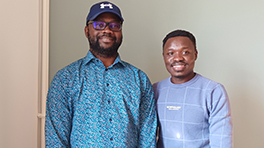
Mike Mwanga – Fostering connections
Recording date: 09.10.2024. Moderator: Djouroukoro Diallo. Production: Patricia Teixidor. Music: Intro and outro: "Yadina" (xylophone duet). CD 1. MBUDI MBUDI NA MHANGA-NYMBO ZA WADODO. The Musical Universe of the Wagogo Children from Tanzania ©PoloVallejo. Musical pauses: Giacomo Forte, "Nairobi"; Blue Dot Sessions, "Dirtbike lovers"; Abdoulaye Alhassane Touré, "Tamala". Free Music Archive.
Mike Mwanga arrived in Bern a year ago to pursue a PhD in the Experimental Virology group at the Institute for Infectious Diseases. Originally from Kilifi, Kenya, he was trained as a bioinformatician in his home country and developed a strong fascination for using computational methods to understand genetic data. His biggest challenge in Bern has been overcoming the language barrier. Mike believes his role as an African scientist is to serve as a bridge, fostering connections between his home country and Switzerland, especially within his field of expertise. He is part of the Genomics for Health in Africa, one of the Clusters of Research Excellence (CoRE) launched by The Guild and the African Research Universities Alliance (ARUA). In 2023, these two organisations jointly launched 20 Africa-Europe CoREs. Mike has proposed that Initiative Afrique could establish exchange programs to allow Swiss students to study at African institutions and vice versa. What he misses most about Kenya is his family and the food.
Episode 9
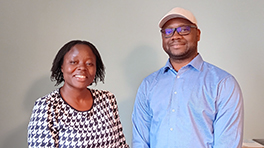
Cecilia Olima – One can still achieve his dreams, even if you decide to have a family
Recording date: 15.11.2024. Moderator: Djouroukoro Diallo. Production: Patricia Teixidor. Music: Intro and outro: "Yadina" (xylophone duet). CD 1. MBUDI MBUDI NA MHANGA-NYMBO ZA WADODO. The Musical Universe of the Wagogo Children from Tanzania. ©PoloVallejo. Musical pauses: Rocky Marsiano, "Munana"; Ketsa, "No clouds"; Abdoulaye Alhassane Touré, "Tamaya". Free Music Archive.
Cecilia Olima arrived in Bern 3 years ago to pursue a PhD in the Integrative Biodiversity and Conservation Science research team at The Wyss Academy for Nature at the University of Bern. She holds a master's degree in Plant Ecology from Kenyatta University. Her master's project focused on assessing coastal protection and harvested goods provided by the mangrove forest in Mida Creek, Kenya. She is passionate about the sustainable use of ecosystems and raising awareness among different stakeholder groups regarding environmental issues and possible ways to solve them. She would like to be a role model to African girls and women, giving them an example of the fact that one can still achieve their dream, even if one decides to have a family. It is never too late to go to school.
Episode 8
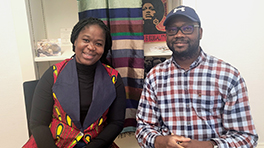
Philipa Birago Akuoko - Gender studies and women’s welfare in global south cities
Recording date: 04.10.2024. Moderator: Djouroukoro Diallo. Production: Patricia Teixidor. Music: Intro and outro: "Yadina" (xylophone duet). CD 1. MBUDI MBUDI NA MHANGA-NYMBO ZA WADODO. The Musical Universe of the Wagogo Children from Tanzania. ©PoloVallejo. Musical pauses: Crowander, "Afronauts"; Blue Dot Sessions, "Dirtbike lovers"; Blue Dot Sessions, "Around plastic card tables". Free Music Archive.
Philipa Birago Akuoko arrived in Bern to pursue a PhD at the Institute of Geography two years ago from Kumasi, Ghana. She is an urban development researcher focusing on spatial planning and informal economy through predominantly qualitative case studies and mixed-method approaches. Her interest also covers gender studies and women’s welfare in the Global South cities. Her biggest challenge at the University of Bern has been living alone without her infants and family, “fighting loneliness” every day. On the positive side, what she values most is the Swiss canton’s uniqueness, the fact that each one has its own identity and iconic image. She feels that one of her roles as an African researcher is to show other people what an African is; as an African woman, her role is to highlight misconceptions. She explained to us how important community building is for Africans and how much Africans love the idea of identifying with others. She suggested that Initiative Afrique could promote more social activities, such as a monthly lunch to share different cultures in a more informal environment. When asked about how to improve research collaborations south-north, Philipa mentioned that Swiss researchers could benefit from the local environment by getting in contact with researchers in Ghana through research stays.
